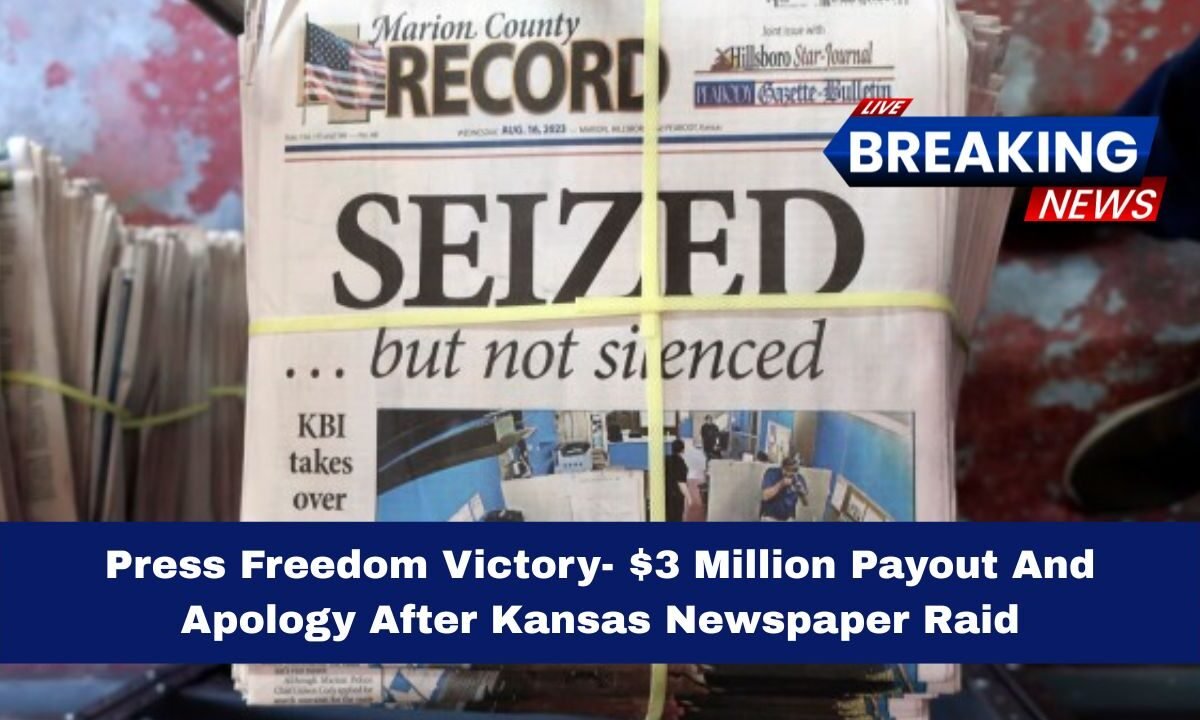A small weekly newspaper in Marion, Kansas has won a major press freedom victory. The Marion County Record, which was the target of a controversial police raid in August 2023, will receive a $3 million settlement and an official public apology from county officials.
The agreement follows a long legal battle over the raid, which saw law enforcement seize computers, phones and reporting materials from the newspaper’s office and the home of its publisher.
The incident drew national and international outrage and became a symbol of how fragile freedom of the press can be in small-town America.
Background: How a Local Newspaper Became a National Story
In August 2023, officers from the local police department and sheriff’s office executed search warrants on:
- The Marion County Record newsroom
- The home of publisher Eric Meyer
- The home of a local city council member
The raid was supposedly tied to allegations that the paper had illegally accessed a local restaurant owner’s driving record while also investigating the background of the then–police chief.
The newspaper insisted it had obtained information legally and had not even published the sensitive details.
During the raid, officers seized:
- Computers and hard drives
- Reporters’ phones
- Documents and reporting notes
Tragically, Joan Meyer, the newspaper’s 98-year-old co-owner and Eric Meyer’s mother, died the day after the raid. Her family believes the shock and stress of the heavy-handed police action contributed to her death.
Details of the $3 Million Settlement and Apology
After months of legal action in federal court, Marion County agreed to pay more than $3 million and issue a formal apology acknowledging that the raid violated the newspaper’s constitutional rights.
Key Settlement Points
- Total payout: Just over $3 million
- Parties compensated: The Marion County Record, its parent company, several staff members, a former city council member and the estate of Joan Meyer
- Joan Meyer’s estate: Receives around $1 million in recognition of the harm and wrongful actions surrounding the raid
- Formal apology: The county sheriff publicly admits the raid was wrong and unconstitutional
The official apology is just as important as the money. In it, county leadership admits that law enforcement went too far, failed to respect legal protections for journalists and did not follow proper procedures before raiding the paper.
Why the Raid Shocked the Nation
The case quickly grew beyond Kansas because it raised serious questions about press freedom, police power and local government accountability.
Key concerns included:
- Possible violation of the First Amendment, which protects freedom of the press
- Possible violation of the Fourth Amendment, which protects against unreasonable searches and seizures
- The chilling message it sent to small newsrooms investigating local officials
- The impact on whistleblowers and confidential sources whose information may have been exposed
Media organizations, journalism groups and civil rights advocates warned that if such a raid went unpunished, it could encourage other officials to use police raids to intimidate or silence critical reporting.
Ongoing Consequences for Local Officials
The settlement does not end every legal and personal consequence flowing from the raid. Some key points:
- The former police chief who helped lead the operation has resigned.
- He now faces a felony charge related to interfering with the judicial process.
- Some legal actions against other local officials continue separately and could lead to more judgments or agreements.
For the Marion County Record, the fight has been about more than money. Publisher Eric Meyer has repeatedly said that the most important outcome is proving that the raid was wrong and setting a clear example that government retaliation against a newspaper will face serious consequences.
What This Means for Press Freedom
The $3 million settlement and official apology send a strong signal across the United States:
- Small newsrooms are not powerless, even in rural areas.
- Abusive use of search warrants against journalists can be defeated in court.
- Local governments may think twice before trying to punish reporters for uncomfortable stories.
The case also highlights why laws protecting newsroom materials and confidential sources are so important in a democracy.
The story of the Marion County Record shows how a small-town newspaper can stand up to government overreach and win.
The $3 million settlement and official apology are more than financial compensation—they are a clear statement that unconstitutional police raids on newsrooms will not be tolerated.
For journalists, readers and communities across the country, this case is a reminder that a free and independent press is essential for democracy, and that even the smallest paper can play a big role in defending those freedoms.




